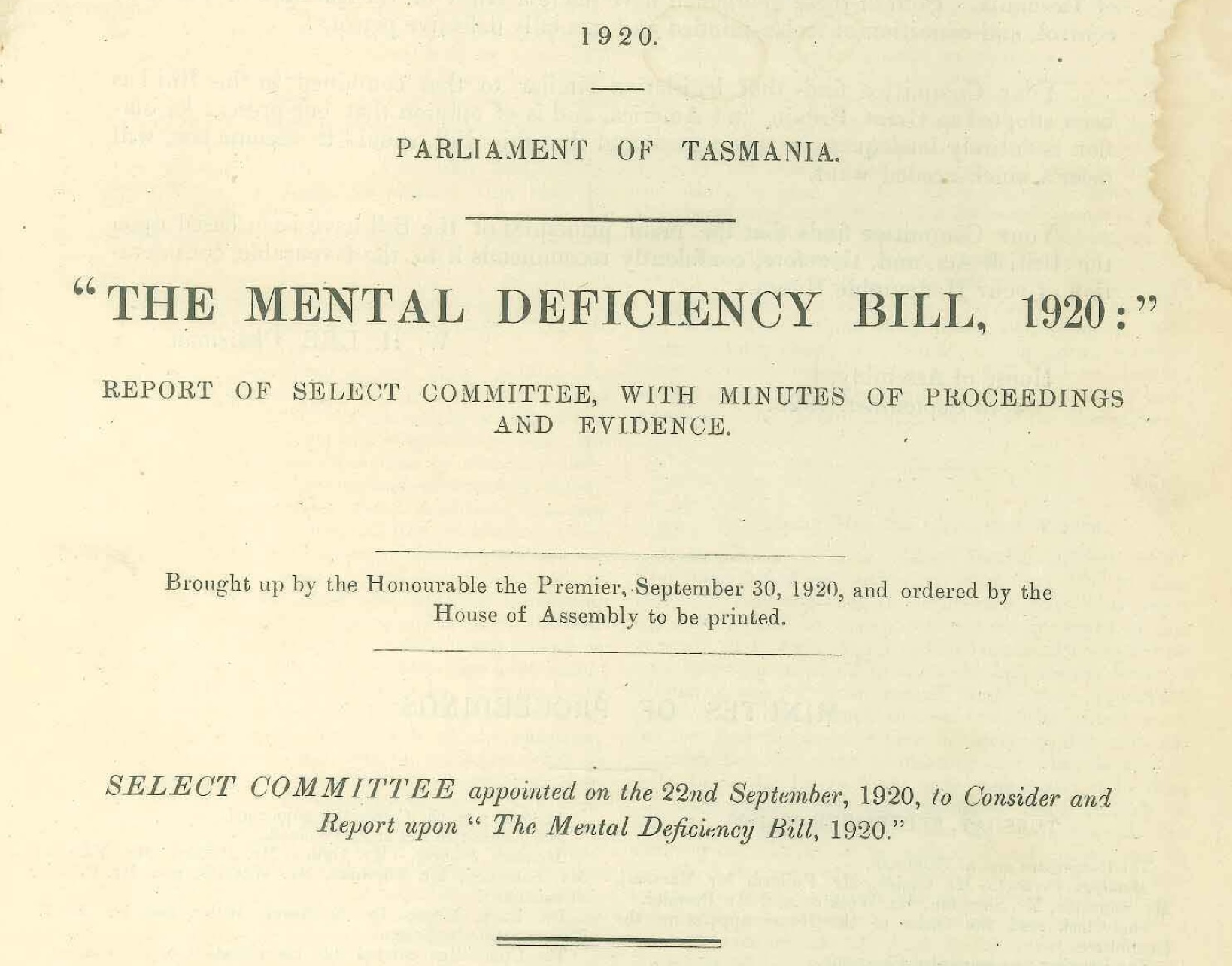The Mental Deficiency Bill 1920 is a report from the select committee which was appointed on the 22nd September 1920 to consider and report upon the Bill. This 8 double page document looks at Tasmania’s 1920 Bill and supplies evidence and minutes of their proceedings.
“The Select Committee appointed by your Honourable House to consider the Mental Deficiency Bill has now the honour to present its report.
Your Committee went into the principles and details of the Bill exhaustively and obtained the views of Dr E. S. Morris, Chief Health Officer of the State, and Dr. E. Morris Miller, M.A., Litt. D Lecturer on Psychology and Philosophy at the University of Tasmania. Both of these gentlemen have made a study of the question of the care, control, and education of feeble-minded and mentally defective persons.
Your Committee finds that legislation similar to that contained in this Bill has been adopted in Great Britain and America, and is of opinion that our present legislation is entirely adequate in this regard, and that this Bill, should it become law, will meet a much needed want.
Your Committee finds that the main principles of the Bill have been based upon the British Act, and, therefore, confidently recommends it to the favourable consideration of your Honourable House.
W. H. LEE, Chairman.
House of Assembly,
28th September, 1920.”
This rare and original document is available in full and free from our documents tab HERE or clicking on the image above. Keep in mind that when the article refers to the Mental Diseases Hospital at New Norfolk it is referring to what we commonly now know as Willow Court or Royal Derwent Hospital.
One of the points on page 3 is an interesting read, here the Chief Health Officer’s Views are expressed:
“I thought the time was ripe at which to start the ball rolling towards educating the public in regard to this most important question. I was struck almost from the outset with the fact that the average man in the street does not distinguish between what is insanity and what is mental deficiency. He lumps them under one head, or he does not understand where the distinction lies. It may be well if I briefly describe to you the distinction we are working on. Both mental deficients and insane may be described as people without money ; but in one case a man has had a banking account and has become bankrupt; that is the insane person. The other one has not had a banking account at all; that is the mental deficient.
He starts off in life absolutely handicapped from birth. Whatever the cause of his mental deficiency, the one fact remains that he will never be able to come up to the standard we consider essential in the ordinary civilised state of existence. If he is of the lowest grade (an idiot), he is a nuisance until he is put in the hospital at New Norfolk-which, by the way, is only touching the very lowest type.”
Dr E. S. Morris,
Chief Health Officer of the State
This documents clearly stated how this Bill was designed to exclude people with Mental Health and or People with disabilities from their community and family of origin. It also has a clear intent to join the eugenics movement,
“The result of that is the man in a great many cases becomes a vagrant, a careless member of society; and the woman, in many cases, becomes likewise a vagrant, but worst of all, many of them of the lower grade become prostitutes, and people of that sort and all of them tend to propagate their own species.”
“While Nature plays an important part in eliminating the defect yet we cannot eliminate the possibility of propagation in the insane, but we can get these at the stage of mental deficients. By stopping them at that stage you are going to save two generations work on the part of Nature.”
This is the language of the time and the thoughts of the time. The report clearly has an opinion of stopping people from propagating as undesirables who will create more undesirables. This was to be done by housing them at New Norfolk.
